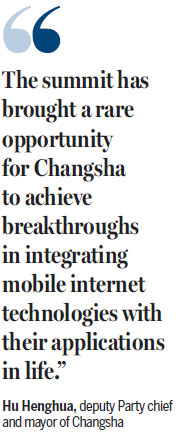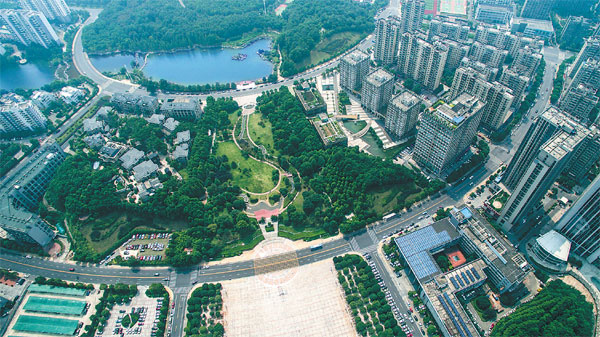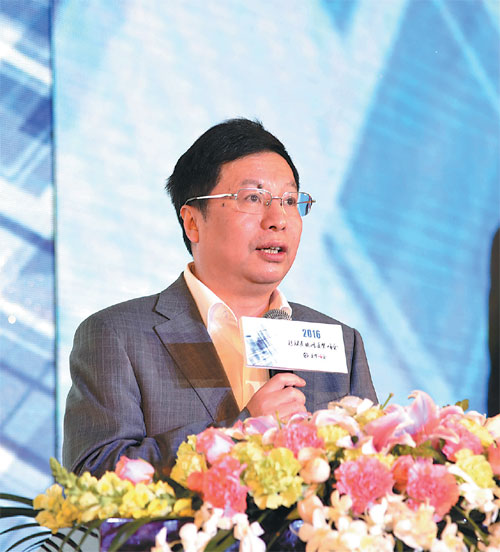Smart city effort boosts mobile internet industry
Updated: 2016-10-11 07:34
By Dong Jidong(HK Edition)
|
|||||||
|
A bird's-eye view of Lugu Industrial Park, part of the Changsha National High-Tech Industrial Development Zone, home to many mobile internet enterprises. Photos provided to China Daily |
|
Hu Henghua, deputy Party chief and mayor of Changsha, speaks at the Yuelu Mobile Internet Summit held in Changsha in March. |
|
Young people experience virtual reality at Hunan Virtual Reality World Intellectual Technology Co in Changsha. |
Government agencies expect the drive to improve efficiency of data sharing and collaboration, Dong Jidong reports.
Changsha, capital of Central China's Hunan province, has vigorously promoted the development of its mobile internet industry over recent years.
The city ranked ninth among 351 cities listed by the Internet Plus Index at the 2016 China Internet Plus Summit held in Beijing in June. It also ranked third, after Shenzhen and Guangzhou, among cities listed by the Internet Plus-Smart City Index.
Last year, the output of the city's mobile internet industry, which employs more than 40,000 people, reached 30 billion yuan ($4.5 billion), twice the figure of the previous year.
By June of this year, the city had more than 2,800 mobile internet enterprises, which generated revenue of nearly 20 billion yuan. Of the enterprises, eight have annual revenue of more than 1 billion yuan and 31 have annual revenue of more than 100 million yuan.
Changsha's booming mobile internet industry should be attributed to the government's efforts in building a smart city, said Du Haixia, deputy director of the city's reform and development commission. Changsha has added the goal of pushing smart city construction into its 13th Five-Year Plan (2016-20) and strived to integrate the Internet Plus strategy with its traditional industries, Du said.
The move is expected to improve the efficiency of data sharing and business collaboration among government agencies, she said.
Leading internet enterprises are also encouraged to participate in the city's construction of centers for Internet Plus, big data and cloud services, she explained, adding that Changsha will build an internet industrial chain that utilizes big data and cloud applications to become a major Internet Plus city in Central China.
To implement the Internet Plus strategy and create a reliable environment for the mobile internet industry's development, the city's economy and information technology commission has been boosting the broadband internet infrastructure since 2014.
By the end of last year, the number of broadband internet users and 4G mobile network users in Changsha surpassed 2.1 million and 5.6 million, respectively. The city's network speed ranked among the top 10 cities in the country.
Deng Zili, head of the commission, said the city will build an intelligent, highly efficient and environmentally friendly industrial system. The city's annual industrial output is expected to reach 1.8 trillion yuan during the 13th Five-Year Plan period, he said.

On March 31, a mobile internet-themed summit was held in Changsha, attracting the attention of both industry insiders and the public.
More than 3,000 people, including representatives of mobile internet enterprises and staff workers from investment and financing organizations, attended the Yuelu Mobile Internet Summit.
A number of mobile internet tycoons from around the world also gathered at the two-day event, including Microsoft CTO Sandy Gupta, LinkedIn Marketing Vice-President Yu Zhiwei, finance writer Wu Xiaobo and IDG Executive Vice-President Xiong Xiaoge.
Changsha will promote the development of a range of leading enterprises that focus on life services that utilize the mobile internet, according to a guideline released by the city government at the summit.
The industry will cover such services as home renovation and decoration, medical care, tourism and catering.
By 2020, the sales of the mobile internet-based life service industry are expected to reach 1 trillion yuan, and 100,000 people will be employed in the industry, according to the guideline.
"The summit has brought a rare opportunity for Changsha to achieve breakthroughs in integrating mobile internet technologies with their applications in life," said Hu Henghua, deputy Party chief and mayor of Changsha.
The city has made great strides in promoting the industry's rapid development over recent years, Hu said. A range of enterprises, including 58 Daojia, Mendale Household Textiles and Broad Homes Industrial International Co, have launched services in the sector.
Moreover, of the mobile internet enterprises in the Changsha National High-Tech Industrial Development Zone, two thirds are engaged in providing mobile internet-related life services.
Contact the writer at dongjidong@chinadaily.com.cn
(HK Edition 10/11/2016 page10)


